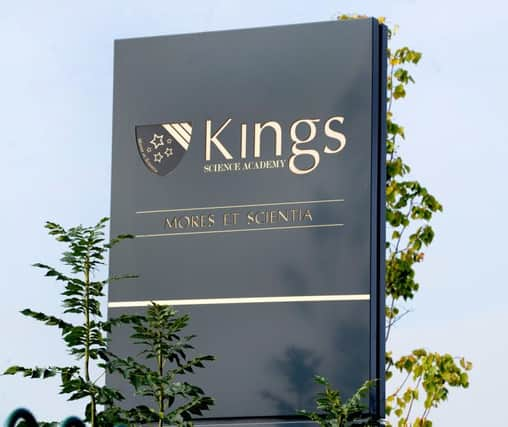Sister of Bradford free school founder denies fraud and false accounting


Shabana Hussain, the sister of Sajid Hussain Raza, who was the founder and principal of the Kings Science Academy, told Leeds Crown Court any money she had received was payment for work she had done.
She, Raza and Daud Khan, the financial director are all standing trial accused of diverting money intended for the school and it is alleged false documents were created to cover their tracks.
Advertisement
Hide AdAdvertisement
Hide AdRaza, 43 of Spring Gardens Road, Heaton, Bradford denies four counts of fraud, three counts of false accounting and two of obtaining money transfer by deception.
Hussain, 40 of Wilmer Road, Heaton, Bradford, denies one charge of fraud and three of false accounting and Khan, 44, of Thornhill Place, Thornbury, denies two counts of fraud and three of false accounting.
James Bourne-Arton defending Hussain said: “It may be suggested this wasn’t money you were entitled to and that in fact you were being used as a vehicle to take money from the grant to be paid to your brother Sajid.”
She said: “No not at all, right from the start I was putting loads of extra hours in.” She said the money was for her work and there was “no credence” to that allegation.
Advertisement
Hide AdAdvertisement
Hide Ad“Did you receive any of this money dishonestly,” he asked. “No,” she replied.
She told the jury she was a qualified history teacher and in 2009 went to Beijing in China to teach at an international school.
She was there when Sajid spoke to her about his plans for a free school in 2010. “He was excited about it.”
She was offered a head of faculty post in China but decided she wanted to return home to Bradford and she agreed to help her brother who was putting his business plans together.
Advertisement
Hide AdAdvertisement
Hide AdHussain told the jury she began helping with the administrative side and there was no real discussion about how much of her time would be involved.
There was only a brief discussion about pay and she was told she might have to work without any but it might be possible to be on “an admin rate.”
“I was just happy to support him.” She said she still had salary saved from her time in China.
Her first task was collating evidence of demand for such a school and that involved contacting the 183 primary schools in Bradford. They also got support from potential feeder schools in the Bradford 7 area.
Advertisement
Hide AdAdvertisement
Hide AdShe was also then involved contributing in other ways on various policies. She received payments which varied in amounts and when it was paid, but assumed it was for her admin work. She had not submitted invoices for it.
“Sajid told me the budget was very tight and I would be paid when and if they had the means to do so.”
She said in May 2011, before the school opened in that September she became aware she should submit invoices. By then she considered staying at the academy as a head of department and she had a conversation with her brother and agreed she was entitled to a rate of £150 a day.
She worked on the curriculum and recruitment of staff. She told the jury she had submitted some invoices in the name of S. Harris during that period because she had been considering changing her name to Harris.
Advertisement
Hide AdAdvertisement
Hide AdBefore making the decision to work at the academy she had been applying for other jobs and was frustrated at the lack of response when she had the right qualifications.
“In my view I think there is some prejudice against names from an ethnic minority group.” She said S. Hussain had drawn jokes at school relating to Saddam Hussein which were hilarious once but not more often.
She had looked into changing it by deed poll but her family, particularly her father was not happy about it and she had not gone ahead with it.
She told the jury payments to her for work on recruitment were correct and she believed she had probably worked more hours than she had claimed on that invoice.
“Is this invoice dishonest?”asked Mr Bourne-Arton.
“No,” she replied.
Advertisement
Hide AdAdvertisement
Hide Ad“Were you entitled to the money you received from it,”he asked.
“I think so,” replied the defendant.
She agreed she had not paid tax on the money she received from the business case grant but said it was due to a misunderstanding she believed it had already been deducted before she received her cheques.
“With the invoices I should have realised, it was my mistake.”
She said she had paid £4,500 to Sajid’s bank account in August 2011 as her contribution to the education of her niece, his daughter and it was in no way connected to Kings Science Academy funds.
“Have you committed a fraud,” asked Mr Bourne-Arton. “No,” replied Hussain.
“Have you received any money you shouldn’t have received?” he said. She again replied: “No.”
The trial continues.